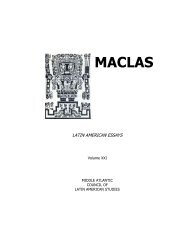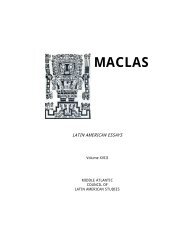latin american essays maclas
latin american essays maclas
latin american essays maclas
You also want an ePaper? Increase the reach of your titles
YUMPU automatically turns print PDFs into web optimized ePapers that Google loves.
solidarity and zeal for international legal reform that set them apart from<br />
their mother countries;<br />
• Third, all the new countries of the Western Hemisphere shared a sense<br />
of solidarity forged by and during their collective struggle for<br />
independence, which united them as a region distinct from Europe. 19<br />
Although Álvarez recognizes that most American republics have domestic<br />
legal systems whose roots can be traced back to Europe, he believes that with<br />
independence—itself a radical challenge to traditional international law—the<br />
American republics started a revolutionary tradition of their own in domestic and<br />
international law. For Álvarez, the wars of independence created a wide legal rift<br />
between the Western Hemisphere and Europe: “While the countries of the New<br />
World sought to gain their independence, [a cause] that their national sentiment led<br />
them to consider legitimate; their metropolises condemned their struggle as a crime<br />
deserving punishment” (1962a, 66; author's translation). Álvarez argues that in this<br />
historical context—the sharing of some common ideas, practices, and norms with<br />
Europe notwithstanding—the Western Hemisphere came to perceive itself as<br />
different from Europe (71). Similarly, although Álvarez acknowledges that there are<br />
differences in the legal and political systems within the New World, he believes that<br />
these differences have not prevented the American republics from developing a<br />
hemispheric-wide sense of solidarity forged by their cooperative struggle for<br />
independence. For him and his philosophical allies, this regional sentiment, or<br />
“Western Hemisphere Idea,” however ethereal, is an extremely powerful concept. 20<br />
The main juridical arguments used by Álvarez and his intellectual associates<br />
to justify the right of the American republics to develop their own regional<br />
international law are the following:<br />
• First, the newly independent American republics have both the right to<br />
reject those norms and practices of the traditional Euro-centric<br />
international legal system that constrained their freedom and the right<br />
to establish new legal principles that would foster their full development<br />
(Álvarez 1962a, 71). Homero Henríquez, a legal scholar from the<br />
Dominican Republic, supports this argument by saying that the birth and<br />
survival of the American republics gave origin to a hemispheric-wide<br />
American International Law. In his view, “exercising the most sacred<br />
human prerogative of independence,” the American republics had a right<br />
both to distance themselves from some of the norms of Euro-centric<br />
international law and to proclaim their own novel legal principles (1948,<br />
7-8; author’s translation). This process of challenging traditional European<br />
international law is exemplified by, among others, the Jeffersonian principle<br />
of self-determination as well as the Calvo, Tejedor, and Drago doctrines of<br />
non-intervention. 21 The Jeffersonian of principle of self-determination<br />
asserts the American republics’ right to independence. The Calvo and<br />
39




